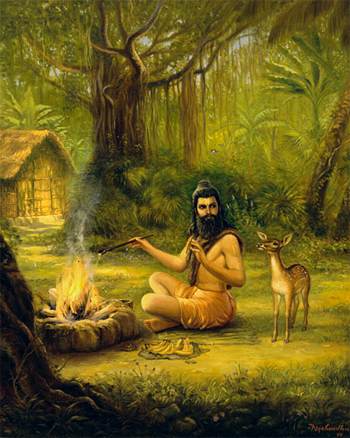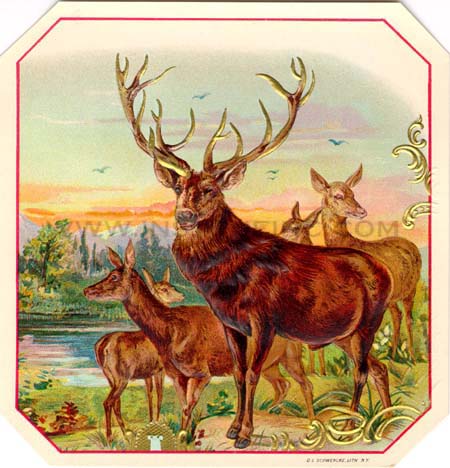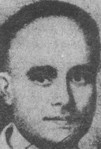The Story of Jada Bharata
(Delivered in California)

There was a great monarch named Bharata. The land which is called India by foreigners is known to her children as Bhârata Varsha. Now, it is enjoined on every Hindu when he becomes old, to give up all worldly pursuits — to leave the cares of the world, its wealth, happiness, and enjoyments to his son — and retire into the forest, there to meditate upon the Self which is the only reality in him, and thus break the bonds which bind him to life. King or priest, peasant or servant, man or woman, none is exempt from this duty: for all the duties of the householder — of the son, the brother, the husband, the father, the wife, the daughter, the mother, the sister — are but preparations towards that one stage, when all the bonds which bind the soul to matter are severed asunder for ever.
The great king Bharata in his old age gave over his throne to his son, and retired into the forest. He who had been ruler over millions and millions of subjects, who had lived in marble palaces, inlaid with gold and silver, who had drunk out of jewelled cups — this king built a little cottage with his own hands, made of reeds and grass, on the banks of a river in the Himalayan forests. There he lived on roots and wild herbs, collected by his own hands, and constantly meditated upon Him who is always present in the soul of man. Days, months, and years passed. One day, a deer came to drink water near by where the royal sage was meditating. At the same moment, a lion roared at a little distance off. The deer was so terrified that she, without satisfying her thirst, made a big jump to cross the river. The deer was with young, and this extreme exertion and sudden fright made her give birth to a little fawn, and immediately after she fell dead. The fawn fell into the water and was being carried rapidly away by the foaming stream, when it caught the eyes of the king. The king rose from his position of meditation and rescuing the fawn from the water, took it to his cottage, made a fire, and with care and attention fondled the little thing back to life. Then the kindly sage took the fawn under his protection, bringing it up on soft grass and fruits. The fawn thrived under the paternal care of the retired monarch, and grew into a beautiful deer. Then, he whose mind had been strong enough to break away from lifelong attachment to power, position, and family, became attached to the deer which he had saved from the stream. And as he became fonder and fonder of the deer, the less and less he could concentrate his mind upon the Lord. When the deer went out to graze in the forest, if it were late in returning, the mind of the royal sage would become anxious and worried. He would think, “Perhaps my little one has been attacked by some tiger — or perhaps some other danger has befallen it; otherwise, why is it late?”
The Stag That Knew Better

To worship is inherent in every man’s nature; only the highest philosophy can rise to pure abstraction. So man will ever personify his God in order to worship Him. This is very good, as long as the symbol, be it what it may, is worshipped as a symbol of the Divinity behind and not in and for itself. Above all, we need to free ourselves from the superstition of believing because ‘it is in the books’… There was once a stag, proud and free, and he talked in a lordly fashion to his child, ‘Look at me, see my powerful horns! With one thrust I can kill a man; it is a fine thing to be a stag!’ Just then the sound of the huntsman’s bugle was heard in the distance, and the stag precipitately fled, followed by his wondering child. When they had reached a place of safety, he inquired, ‘Why do you fly before man, O my father, when you are so strong and brave?’ The stag answered, ‘My child, I know I am strong and powerful, but when I hear that sound, something seizes me and makes me fly whether I will or no.’ So with us. We hear the ‘bugle sound’ of the laws laid down in the books, habits and old superstitions lay hold of us; and before we know it, we are fast bound and forget our real nature which is freedom. (CW, 8:33-34)
The Proof of Astrology:
The Astrologer, the King and the Minister
There is an old story of an astrologer who came to a king and said, ‘You are going to die in six months.’ The king was frightened out of his wits and was almost about to die then and there from fear. But his minister was a clever man, and this man told the king that these astrologers were fools. The king would not believe him. So the minister saw no other way to make the king see that they were fools but to invite the astrologer to the palace again. There he asked him if his calculations were correct. The astrologer said that there could not be a mistake, but to satisfy him he went through the whole of the calculations again and then said that they were perfectly correct. The king’s face became livid. The minister said to the astrologer, ‘And when do you think that you will die?’ ‘In twelve years’, was the reply. The minister quickly drew his sword and separated the astrologer’s head from the body and said to the king, ‘Do you see this liar? He is dead this moment.’
The Pious Missionary
A pious missionary went out on business. All of a sudden his three sons died of cholera. His wife covered the three dead bodies of her beloved children with a sheet and was awaiting her husband at the gate. When he returned, she detained him at the gate and put him the question, “My dear husband, some one entrusts something to you and in your absence suddenly takes it back. Will you feel sorry?” He replied, “Certainly I would not”. Then she took him in, removed the sheet and showed the three corpses. He bore this calmly and buried the bodies. Such is the strength of mind of those who hold firm faith in the existence of an all-merciful God who disposes of everything in the universe.
Vidyasagar
The hero of widow re-marriage, and of the abolition of polygamy.

Sister Nivedita wrote that Swami Vivekananda called Vidyasagar “the hero of widow remarriage, and of the aboliton of polygamy.”
Desire God and You Shall Have God
Of course you must understand, there is a difference between desire and desire. The master said, “My child, if you desire after God, God shall come to you.” The disciple did not understand his master fully. One day both went to bathe in a river, and the master said, “Plunge in”, and the boy did so. In a moment the master was upon him, holding him down. He would not let the boy come up. When the boy struggled and was exhausted, he let him go. “Yes, my child, how did you feel there;” “Oh, the desire for a breath of air!” “Do you have that kind of desire for God?” “No, sir.” “Have that kind of desire for God and you shall have God.”
The dog’s curly tail
There was a poor man who wanted some money; and somehow he had heard that if he could get hold of a ghost, he might command him to bring money or anything else he liked; so he was very anxious to get hold of a ghost. He went about searching for a man who would give him a ghost, and at last he found a sage with great powers, and besought his help. The sage asked him what he would do with a ghost. “I want a ghost to work for me; teach me how to get hold of one, sir; I desire it very much,” replied the man. But the sage said, “Don’t disturb yourself, go home.” The next day the man went again to the sage and began to weep and pray, “Give me a ghost; I must have a ghost, sir, to help me.” At last the sage was disgusted, and said, “Take this charm, repeat this magic word, and a ghost will come, and whatever you say to him he will do. But beware; they are terrible beings, and must be kept continually busy. If you fail to give him work, he will take your life.” The man replied, “That is easy; I can give him work for all his life.” Then he went to a forest, and after long repetition of the magic word, a huge ghost appeared before him, and said, “I am a ghost. I have been conquered by your magic; but you must keep me constantly employed. The moment you fail to give me work I will kill you.” The man said, “Build me a palace,”, and the ghost said, “It is done; the palace is built.” “Bring me money,” said the man. “Here is your money,” said the ghost. “Cut this forest down, and build a city in its place.” “That is done,” said the ghost, “anything more?” Now the man began to be frightened and thought he could give him nothing more to do; he did everything in a trice. The ghost said, “Give me something to do or I will eat you up.” The poor man could find no further occupation for him, and was frightened. So he ran and ran and at last reached the sage, and said, “Oh, sir, protect my life!” The sage asked him what the matter was, and the man replied, “I have nothing to give the ghost to do. Everything I tell him to do he does in a moment, and he threatens to eat me up if I do not give him work.” Just then the ghost arrived, saying, “I’ll eat you up,” and he would have swallowed the man. The man began to shake, and begged the sage to save his life. The sage said, “I will find you a way out. Look at that dog with a curly tail. Draw your sword quickly and cut the tail off and give it to the ghost to straighten out.” The man cut off the dog’s tail and gave it to the ghost, saying, “Straighten that out for me.” The ghost took it and slowly and carefully straightened it out, but as soon as he let it go, it instantly curled up again. Once more he laboriously straightened it out, only to find it again curled up as soon as he attempted to let go of it. Again he patiently straightened it out, but as soon as he let it go, it curled up again. So he went on for days and days, until he was exhausted and said, “I was never in such trouble before in my life. I am an old veteran ghost, but never before was I in such trouble.” “I will make a compromise with you;” he said to the man, “you let me off and I will let you keep all I have given you and will promise not to harm you.” The man was much pleased, and accepted the offer gladly.
The young Sanyasin, the Woman and the Vyadha
A young Sannyasin went to a forest; there he meditated, worshipped, and practised Yoga for a long time. After years of hard work and practice, he was one day sitting under a tree, when some dry leaves fell upon his head. He looked up and saw a crow and a crane fighting on the top of the tree, which made him very angry. He said, “What! Dare you throw these dry leaves upon my head!” As with these words he angrily glanced at them, a flash of fire went out of his head–such was the Yogi’s power–and burnt the birds to ashes. He was very glad, almost overjoyed at this development of power–he could burn the crow and the crane by a look. After a time he had to go to the town to beg his bread. He went, stood at a door, and said, “Mother, give me food.” A voice came from inside the house, “Wait a little, my son.” The young man thought, “You wretched woman, how dare you make me wait! You do not know my power yet.” While he was thinking thus the voice came again: “Boy, don’t be thinking too much of yourself. Here is neither crow nor crane.” He was astonished; still he had to wait. At last the woman came, and he fell at her feet and said, “Mother, how did you know that?” She said, “My boy, I do not know your Yoga or your practices. I am a common everyday woman. I made you wait because my husband is ill, and I was nursing him. All my life I have struggled to do my duty. When I was unmarried, I did my duty to my parents; now that I am married, I do my duty to my husband; that is all the Yoga I practise. But by doing my duty I have become illumined; thus I could read your thoughts and know what you had done in the forest. If you want to know something higher than this, go to the market of such and such a town where you will find a Vyadha who will tell you something that you will be very glad to learn.” The Sannyasin thought, “Why should I go to that town and to a Vyadha?” But after what he had seen, his mind opened a little, so he went. When he came near the town, he found the market and there saw, at a distance, a big fat Vyadha cutting meat with big knives, talking and bargaining with different people. The young man said, “Lord help me! Is this the man from whom I am going to learn? He is the incarnation of a demon, if he is anything.” In the meantime this man looked up and said, “O Swami, did that lady send you here? Take a seat until I have done my business.” The Sannyasin thought, “What comes to me here?” He took his seat; the man went on with his work, and after he had finished he took his money and said to the Sannyasin, “Come sir, come to my home.” On reaching home the Vyadha gave him a seat, saying, “Wait here,” and went into the house. He then washed his old father and mother, fed them, and did all he could to please them, after which he came to the Sannyasin and said, “Now, sir, you have come here to see me; what can I do for you?” The Sannyasin asked him a few questions about soul and about God, and the Vyadha gave him a lecture which forms a part of the Mahabharata, called the Vyadha Gita . It contains one of the highest flights of the Vedanta. When the Vyadha finished his teaching, the Sannyasin felt astonished. He said, “Why are you in that body? With such knowledge as yours why are you in a Vyadha’s body, and doing such filthy, ugly work?” “My son,” replied the Vyadha, “no duty is ugly, no duty is impure. My birth placed me in these circumstances and environments. In my boyhood I learnt the trade; I am unattached, and I try to do my duty well. I try to do my duty as a householder, and I try to do all I can to make my father and mother happy. I neither know your Yoga, nor have I become a Sannyasin, nor did I go out of the world into a forest; nevertheless, all that you have heard and seen has come to me through the unattached doing of the duty which belongs to my position.”